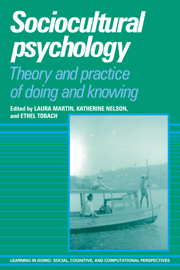Book contents
- Frontmatter
- Contents
- Series foreword
- Preface
- Contributors
- 1 Introduction
- Part I History and culture
- Part II Doing psychology
- 5 Opening vistas for cognitive psychology
- 6 Analysis of developmental processes in sociocultural activity
- 7 Linking thought and setting in the study of workplace learning
- 8 Cultural–historical psychology: A meso-genetic approach
- 9 The abstract and the concrete
- 10 From spontaneous to scientific concepts: Continuities and discontinuities from childhood to adulthood
- 11 The psychology of Japanese literacy: Expanding “the practice account”
- 12 Voices of thinking and speaking
- Part IV Activity in work and school
- Index
11 - The psychology of Japanese literacy: Expanding “the practice account”
Published online by Cambridge University Press: 05 November 2011
- Frontmatter
- Contents
- Series foreword
- Preface
- Contributors
- 1 Introduction
- Part I History and culture
- Part II Doing psychology
- 5 Opening vistas for cognitive psychology
- 6 Analysis of developmental processes in sociocultural activity
- 7 Linking thought and setting in the study of workplace learning
- 8 Cultural–historical psychology: A meso-genetic approach
- 9 The abstract and the concrete
- 10 From spontaneous to scientific concepts: Continuities and discontinuities from childhood to adulthood
- 11 The psychology of Japanese literacy: Expanding “the practice account”
- 12 Voices of thinking and speaking
- Part IV Activity in work and school
- Index
Summary
In this chapter I will try to expand and enrich “a practice account of literacy” proposed by Scribner and Cole (1981), by applying it to the question of literacy in standard Japanese orthography. Scribner and Cole's account or framework conceptualizes literacy not as “simply knowing how to read and write a particular script” but as “applying this knowledge for specific purposes in specific contexts of use” (p. 236). It assumes that both how literacy is acquired and what cognitive consequences it has depend on a set of socially organized literacy practices in which people engage. I will examine issues related to Japanese literacy relying on this assumption. Although it is not possible to compare literates and nonliterates or the schooled and unschooled in Japan, I will discuss the role of a school in the acquisition of literacy, and also whether literacy has generalized effects on linguistic communication.
Scribner and Cole (1981) made a significant contribution to the field of culture and cognition, as most investigators in the field agree. Theoretically, their work stands as a monument in the history of our understanding of cognitive outcomes produced by everyday activity, alongside Cole, Gay, Glick, and Sharp (1971) and Rogoff and Lave (1984). Empirically, their book reports two rather surprising results: (1) the dissociability of literacy from schooling, and (2) the localized cognitive consequences of literacy. Unlike earlier investigators including Scribner (1968), Scribner and Cole stress that schooling and the acquisition of literacy not only should be distinguished conceptually but also may be separable in practice.
- Type
- Chapter
- Information
- Sociocultural PsychologyTheory and Practice of Doing and Knowing, pp. 250 - 275Publisher: Cambridge University PressPrint publication year: 1995
- 8
- Cited by



